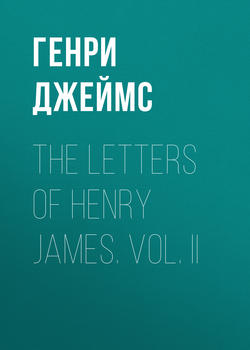Читать книгу The Letters of Henry James. Vol. II - Генри Джеймс, Henry Foss James - Страница 18
VI
Rye (continued)
(1904-1909)
To William James
ОглавлениеLamb House, Rye.
November 23rd, 1905.
Dearest William,
I wrote not many days since to Aleck, and not very, very many before to Peggy—but I can't, to-night, hideously further postpone acknowledging your so liberal letter of Oct. 22nd (the one in which you enclosed me Aleck's sweet one,) albeit I have been in the house all day without an outing, and very continuously writing, and it is now 11 p.m. and I am rather fagged.... However, I shall write to Alice for information—all the more that I deeply owe that dear eternal Heroine a letter. I am not "satisfied about her," please tell her with my tender love, and should have testified to this otherwise than by my long cold silence if only I hadn't been, for stress of composition, putting myself on very limited contribution to the post. The worst of these bad manners are now over, and please tell Alice that my very next letter shall be to her. Only she mustn't put pen to paper for me, not so much as dream of it, before she hears from me. I take a deep and rich and brooding comfort in the thought of how splendidly you are all "turning out" all the while—especially Harry and Bill, and especially Peg, and above all, Aleck—in addition to Alice and you. I turn you over (in my spiritual pocket,) collectively and individually, and make you chink and rattle and ring; getting from you the sense of a great, though too-much (for my use) tied-up fortune. I have great joy (tell him with my love) of the news of Bill's so superior work, and yearn to have some sort of a squint at it. Tell him, at any rate, how I await him, for his holidays, out here—on this spot—and I wish I realized more richly Harry's present conditions. I await him here not less.
I mean (in response to what you write me of your having read the Golden B.) to try to produce some uncanny form of thing, in fiction, that will gratify you, as Brother—but let me say, dear William, that I shall greatly be humiliated if you do like it, and thereby lump it, in your affection, with things, of the current age, that I have heard you express admiration for and that I would sooner descend to a dishonoured grave than have written. Still I will write you your book, on that two-and-two-make-four system on which all the awful truck that surrounds us is produced, and then descend to my dishonoured grave—taking up the art of the slate pencil instead of, longer, the art of the brush (vide my lecture on Balzac.) But it is, seriously, too late at night, and I am too tired, for me to express myself on this question—beyond saying that I'm always sorry when I hear of your reading anything of mine, and always hope you won't—you seem to me so constitutionally unable to "enjoy" it, and so condemned to look at it from a point of view remotely alien to mine in writing it, and to the conditions out of which, as mine, it has inevitably sprung—so that all the intentions that have been its main reason for being (with me) appear never to have reached you at all—and you appear even to assume that the life, the elements forming its subject-matter, deviate from felicity in not having an impossible analogy with the life of Cambridge. I see nowhere about me done or dreamed of the things that alone for me constitute the interest of the doing of the novel—and yet it is in a sacrifice of them on their very own ground that the thing you suggest to me evidently consists. It shows how far apart and to what different ends we have had to work out (very naturally and properly!) our respective intellectual lives. And yet I can read you with rapture—having three weeks ago spent three or four days with Manton Marble at Brighton and found in his hands ever so many of your recent papers and discourses, which, having margin of mornings in my room, through both breakfasting and lunching there (by the habit of the house,) I found time to read several of—with the effect of asking you, earnestly, to address me some of those that I so often, in Irving St., saw you address to others who were not your brother. I had no time to read them there. Philosophically, in short, I am "with" you, almost completely, and you ought to take account of this and get me over altogether.—There are two books by the way (one fictive) that I permit you to raffoler about as much as you like, for I have been doing so myself—H. G. Wells's Utopia and his Kipps. The Utopia seems to me even more remarkable for other things than for his characteristic cheek, and Kipps is quite magnificent. Read them both if you haven't—certainly read Kipps.—There's also another subject I'm too full of not to mention the good thing I've done for myself—that is, for Lamb House and my garden—by moving the greenhouse away from the high old wall near the house (into the back garden, setting it up better—against the street wall) and thereby throwing the liberated space into the front garden to its immense apparent extension and beautification....
But oh, fondly, good-night!
Ever your
HENRY.
